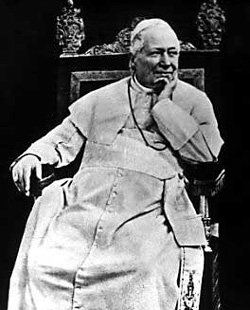 |
| Pope Pius IX |
he needed to address an imbalance in the volume: fourth-fifths of the essays addressed the history of Jesuits before their suppression in 1773. “[T]here are relatively few good studies of the Jesuits since 1814 – in any part of the world – at least compared with the abundance of excellent work done on the history of the ‘old’ Society and its ‘corporate’ culture,” Worcester explained. “In general, the Society of Jesus, for much of the century and a half from its restoration until Vatican II, was conservative and even reactionary.” (7-8)
Just one year earlier, John McGreevy, made the point even
stronger in America magazine. Reviewing Gerald McKevitt’s Brokers
of Culture: Italian Jesuits in the American West, 1848-1919 (Stanford,
2006), McGreevy wrote:
“19th-century Jesuits – fervently ultramontane, devoted to the Sacred Heart, fierce defenders of Pope Pius IX and the 1870 definition of papal infallibility and suspicious of liberalism in all its varieties and the public schools that seemed to inculcate it – surely seemed unlikely role models for Jesuits and non-Jesuit scholars in the immediate postconciliar era.”
It might be difficult to identify with men whose worldview
was shaped as much by the 1773-1814 suppression as by the European liberal
revolutions that forced them into exile (once again) to all corners of the
globe a generation later. And yet, to ignore the post-1814 Jesuits is to miss a
crucial aspect of Catholic history over the last two centuries. For one thing, the story of the Jesuits in America, is a
story of the Restored Society. All but
one of the twenty-eight Jesuit colleges and universities in the United States
today – and all of the secondary schools – were founded by Restored Jesuits. But the story of the Restored Jesuits is far broader: they were
a globalizing force in the “long nineteenth century,” the age reframed by C.A.
Bayly, as The Birth of the Modern World, 1780-1914 (Blackwell, 2004). 2014 marks the bicentennial year of the lifting of the Suppression. In commemoration of the Restoration, Loyola
University Chicago is hosting a major conference on
October 16-19, 2014. It aims to bring
together junior and senior scholars to begin a conversation about the
contribution to American identity of both restored Jesuits and the women
religious with whom they worked in their enterprises. The conference aims at locating these
initiatives within the
specific experiential context of building an American nation. The
stories of these men and women provide studies in what Thomas Tweed has termed Crossing and Dwelling (Harvard, 2006):
the crossings and
dwellings of refugees from European exclusions; transatlantic
immigrants; multilingual and transnational identities; settlers in ethnic urban
cores; boundary-dwellers in frontier peripheries. A copy of CFP can be found here, with a
February 1, 2014 deadline for proposals.
Link (here) to US Religion
No comments:
Post a Comment
Due to a high volume of spamming I have had to enable comment moderation. It may take a day to see your comment published. Respectful and thoughtful comments welcome